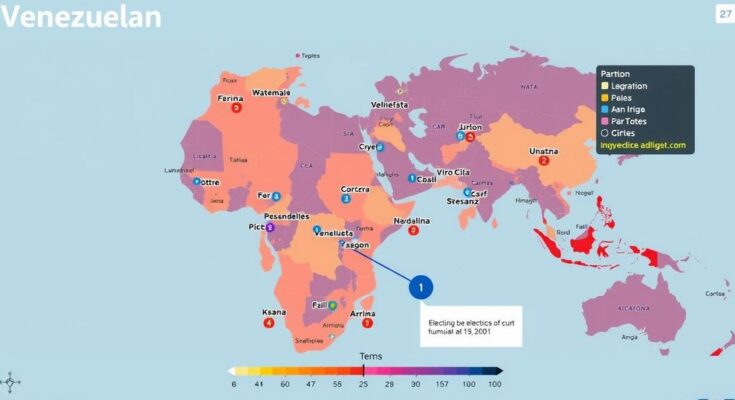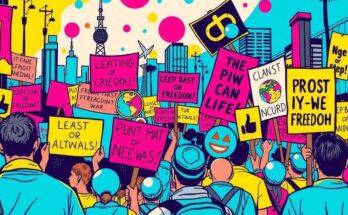Following the controversial July 2024 Venezuelan presidential elections, Nicolás Maduro and opposition candidate Edmundo González Urrutia both declared victories. The National Electoral Council supported Maduro’s claims, leading to widespread allegations of fraud. While the U.S. and other nations recognized González Urrutia as president-elect, Maduro’s administration faced international condemnation and calls for transparency. As tensions rise, the next president is set to be inaugurated on January 10, 2025, amid ongoing investigations into the election’s legitimacy.
On July 29, 2024, both Nicolás Maduro and opposition candidate Edmundo González Urrutia claimed victory in the Venezuelan presidential election held the previous day. The National Electoral Council (CNE) supported Maduro’s assertion, despite widespread allegations of electoral fraud from the opposition and the international community. Political analyst MJ Peterson from the University of Massachusetts commented, “What happened in July and is happening now is the continuation of a long saga of Maduro working to stay in power.”
At the polls, millions of Venezuelans sought change from the ruling Chavista regime. Due to governmental restrictions barring opposition leader María Corina Machado from running, support shifted to her surrogate, González Urrutia. Peterson noted, “[Machado] endorsed the idea that he should run instead because he was not under the ban.”
The CNE reported that Maduro received 51% of the votes, while González Urrutia garnered 44%. However, the CNE has not produced substantial evidence to validate Maduro’s victory. The Democratic Unitary Platform (PUD) contested these figures, asserting, “this is the Venezuelan election with the largest margin of victory in history,” and published results from electronic voting machines indicating González Urrutia won by a significant margin of nearly 30%.
On August 1st, U.S. Secretary of State Antony J. Blinken expressed solidarity with Venezuelans, criticizing the CNE as “deeply flawed” and stating that the election process lacked credibility. Consequently, the U.S. officially recognized González Urrutia as president-elect, a sentiment echoed by other nations including Brazil and Colombia, who demanded transparency regarding voting records. In contrast, countries such as Russia and China congratulated Maduro, despite the controversy.
In September, Maduro’s administration issued an arrest warrant for González Urrutia, forcing him into exile in Spain. He later revealed on social media that he was coerced into recognizing Maduro’s victory to facilitate his departure. “In those moments, I felt I would be more useful free, rather than incarcerated and incapable of completing the tasks entrusted to me by the sovereign,” he stated.
Looking forward, on October 16, Maduro announced plans for his third term inauguration, dismissing international concerns. Peterson observed, “Maduro is signaling very clearly he’s going to stay in power and he doesn’t care what anybody else thinks.” Meanwhile, Machado expressed optimism that González Urrutia might be inaugurated on January 10, 2025, contingent on the actions of the Venezuelan populace. Peterson remarked on the pivotal role the military may play in potential regime change, indicating that authoritarian leaders face peril when state security turns against them.
As international scrutiny continues, a UN watchdog group has initiated an investigation into the allegations of election fraud, urging the Venezuelan government to preserve voting records. Following the recent U.S. presidential election, Maduro has sought to establish a cordial relationship with incoming President Donald Trump, whose position on Venezuela remains uncertain. The next President of Venezuela is scheduled for inauguration on January 10, 2025.
The 2024 Venezuelan presidential elections are set against a backdrop of political tension and widespread allegations of electoral malpractice. Nicolás Maduro continues to maintain a tight grip on power, leading a government accused of authoritarianism and corruption. The opposition, fragmented and facing governmental hurdles, sought a unifying candidate in Edmundo González Urrutia, following restrictions placed on popular leader María Corina Machado. This election is not only a contest for office but a critical moment in the ongoing struggle for democratic representation in Venezuela, with significant implications for regional stability and international relations. The reactions of foreign governments and international organizations further highlight the stakes involved in this electoral process.
The 2024 Venezuelan elections underscore a significant clash between the established regime of Nicolás Maduro and opposition forces seeking democratic legitimacy. With both Maduro and González Urrutia claiming victory amid allegations of electoral fraud, the international community remains divided. The potential for significant changes hinges not only on domestic actions but also on the military’s loyalty, international pressure, and ongoing inquiries into the election’s validity by organizations such as the UN. The evolving situation in Venezuela continues to captivate global attention as the date of the next presidential inauguration approaches.
Original Source: dailycollegian.com




